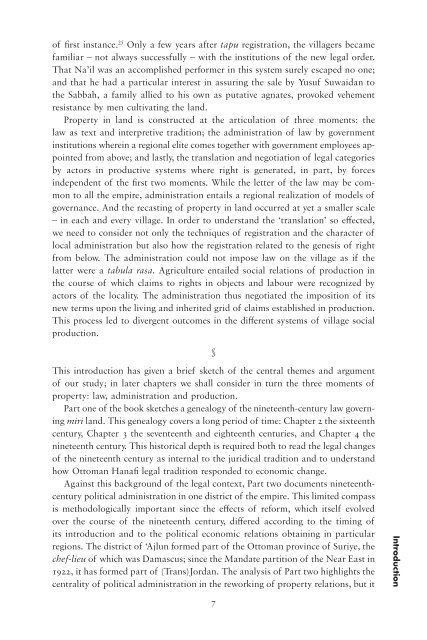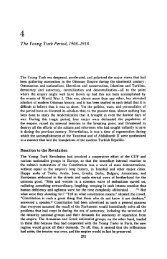Governing property, making the modern state - PSI424
Governing property, making the modern state - PSI424
Governing property, making the modern state - PSI424
You also want an ePaper? Increase the reach of your titles
YUMPU automatically turns print PDFs into web optimized ePapers that Google loves.
of first instance. 25 Only a few years after tapu registration, <strong>the</strong> villagers became<br />
familiar – not always successfully – with <strong>the</strong> institutions of <strong>the</strong> new legal order.<br />
That Na’il was an accomplished performer in this system surely escaped no one;<br />
and that he had a particular interest in assuring <strong>the</strong> sale by Yusuf Suwaidan to<br />
<strong>the</strong> Sabbah, a family allied to his own as putative agnates, provoked vehement<br />
resistance by men cultivating <strong>the</strong> land.<br />
Property in land is constructed at <strong>the</strong> articulation of three moments: <strong>the</strong><br />
law as text and interpretive tradition; <strong>the</strong> administration of law by government<br />
institutions wherein a regional elite comes toge<strong>the</strong>r with government employees appointed<br />
from above; and lastly, <strong>the</strong> translation and negotiation of legal categories<br />
by actors in productive systems where right is generated, in part, by forces<br />
independent of <strong>the</strong> first two moments. While <strong>the</strong> letter of <strong>the</strong> law may be common<br />
to all <strong>the</strong> empire, administration entails a regional realization of models of<br />
governance. And <strong>the</strong> recasting of <strong>property</strong> in land occurred at yet a smaller scale<br />
– in each and every village. In order to understand <strong>the</strong> ‘translation’ so effected,<br />
we need to consider not only <strong>the</strong> techniques of registration and <strong>the</strong> character of<br />
local administration but also how <strong>the</strong> registration related to <strong>the</strong> genesis of right<br />
from below. The administration could not impose law on <strong>the</strong> village as if <strong>the</strong><br />
latter were a tabula rasa. Agriculture entailed social relations of production in<br />
<strong>the</strong> course of which claims to rights in objects and labour were recognized by<br />
actors of <strong>the</strong> locality. The administration thus negotiated <strong>the</strong> imposition of its<br />
new terms upon <strong>the</strong> living and inherited grid of claims established in production.<br />
This process led to divergent outcomes in <strong>the</strong> different systems of village social<br />
production.<br />
§<br />
This introduction has given a brief sketch of <strong>the</strong> central <strong>the</strong>mes and argument<br />
of our study; in later chapters we shall consider in turn <strong>the</strong> three moments of<br />
<strong>property</strong>: law, administration and production.<br />
Part one of <strong>the</strong> book sketches a genealogy of <strong>the</strong> nineteenth-century law governing<br />
miri land. This genealogy covers a long period of time: Chapter 2 <strong>the</strong> sixteenth<br />
century, Chapter 3 <strong>the</strong> seventeenth and eighteenth centuries, and Chapter 4 <strong>the</strong><br />
nineteenth century. This historical depth is required both to read <strong>the</strong> legal changes<br />
of <strong>the</strong> nineteenth century as internal to <strong>the</strong> juridical tradition and to understand<br />
how Ottoman Hanafi legal tradition responded to economic change.<br />
Against this background of <strong>the</strong> legal context, Part two documents nineteenthcentury<br />
political administration in one district of <strong>the</strong> empire. This limited compass<br />
is methodologically important since <strong>the</strong> effects of reform, which itself evolved<br />
over <strong>the</strong> course of <strong>the</strong> nineteenth century, differed according to <strong>the</strong> timing of<br />
its introduction and to <strong>the</strong> political economic relations obtaining in particular<br />
regions. The district of ‘Ajlun formed part of <strong>the</strong> Ottoman province of Suriye, <strong>the</strong><br />
chef-lieu of which was Damascus; since <strong>the</strong> Mandate partition of <strong>the</strong> Near East in<br />
1922, it has formed part of (Trans)Jordan. The analysis of Part two highlights <strong>the</strong><br />
centrality of political administration in <strong>the</strong> reworking of <strong>property</strong> relations, but it<br />
7<br />
Introduction












